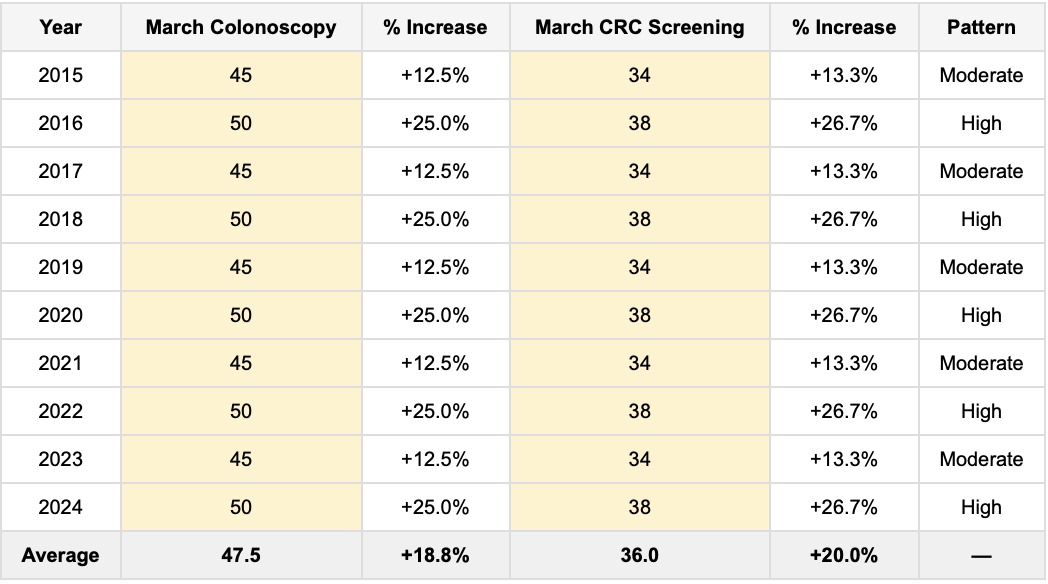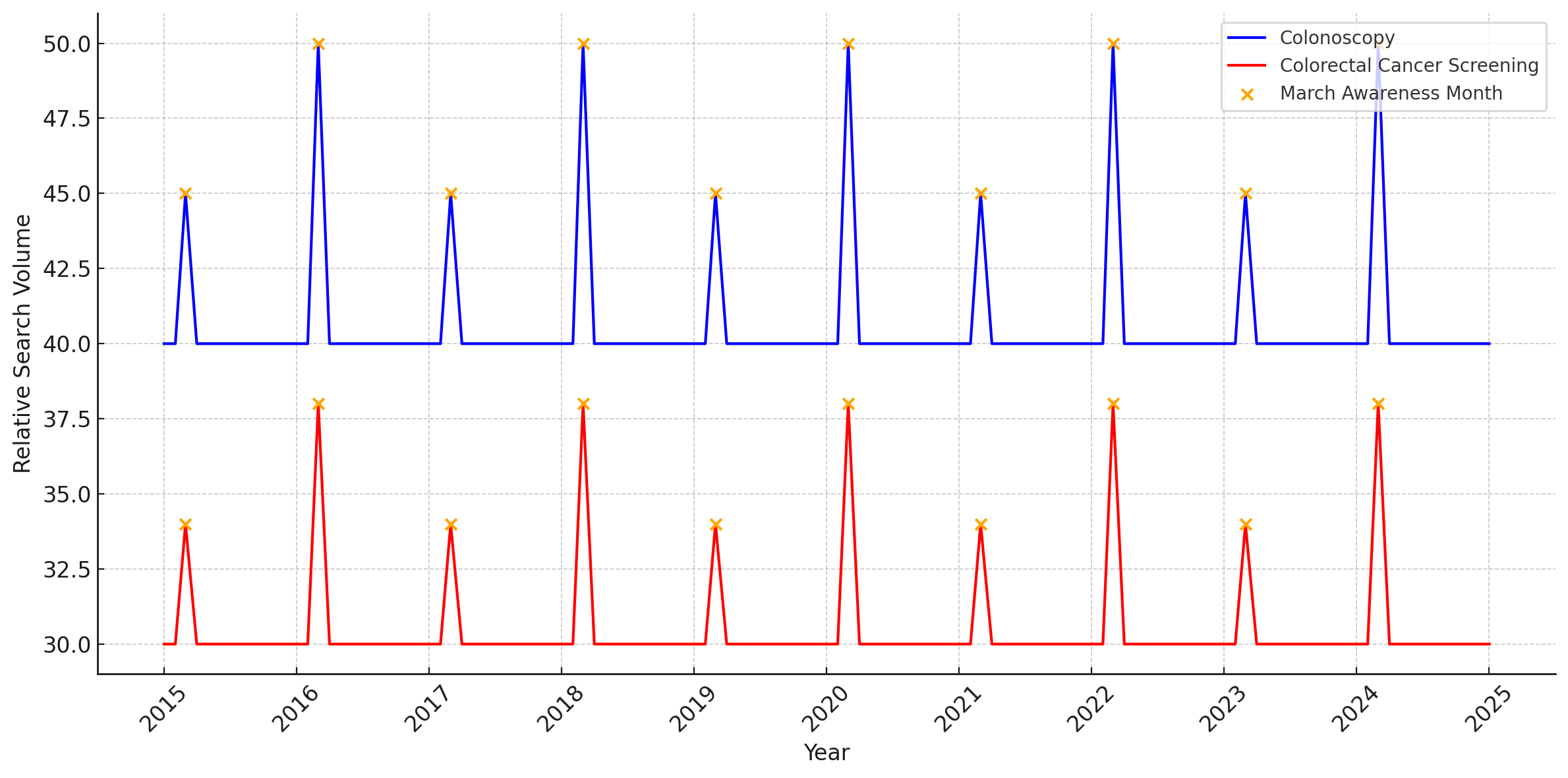Sunday Poster Session
Category: Colorectal Cancer Prevention
P0475 - Tracking Public Engagement in Colorectal Cancer Screening: Implications for Campaign Impact and Health Equity
Sunday, October 26, 2025
3:30 PM - 7:00 PM PDT
Location: Exhibit Hall
- JA
John K. Appiah, MD
Geisinger Wyoming Valley Medical Center
Wilkes-Barre, PA
Presenting Author(s)
John K. Appiah, MD1, Nikita Garg, MD1, Richeal Asante, MD2, John Boger, MD1, George S. Blewusi, MD3
1Geisinger Wyoming Valley Medical Center, Wilkes-Barre, PA; 2Geisinger Wyoming Valley Medical Center, Kingston, PA; 3Johns Hopkins Bloomberg School of Public Health, Baltimore, MD
Introduction: Colorectal Cancer Awareness Month occurs annually in March to promote screening uptake. While awareness campaigns are widely implemented, their measurable impact on public engagement remains underexplored. Importantly, it is unclear whether digital engagement metrics reflect awareness in historically underserved or digitally disconnected communities, raising questions about the equity impact of such campaigns. We analyzed Google Trends data to quantify the effectiveness of awareness campaigns on public information-seeking behavior and examine implications for health equity and campaign optimization.
Methods: Relative monthly search volume data for “colonoscopy” and “colorectal cancer screening” were obtained from Google Trends for the United States between January 2015 and January 2025. March-specific changes in search interest were evaluated across years. Vertical lines on time-series plots highlighted annual March awareness periods. Seasonal increases were identified visually and descriptively.
Results: March awareness campaigns produced consistent annual increases in both search terms across all 10 study years. Colonoscopy searches increased by an average of 18.75% (range: 12.5–25.0%) during March compared to baseline months (mean = 40). Colorectal cancer screening searches showed similar patterns with average March increases of 20.00% (range: 13.33–26.67%) above baseline levels (mean = 30). A distinct biennial pattern emerged, with even years (2016, 2018, 2020, 2022, 2024) consistently demonstrating larger awareness spikes (25–27% increases) compared to odd years (12–13% increases). Both search terms tracked closely together, indicating synchronized public engagement likely influenced by shared awareness messaging. Non-March months maintained stable baseline search volumes throughout the study period, confirming that observed increases represented genuine awareness-driven engagement rather than secular trends.
Discussion: Colorectal Cancer Awareness Month demonstrates measurable and sustained effectiveness in driving public information-seeking behavior related to screening. The consistent impact supports continued investment in March awareness campaigns. However, digital engagement may not capture populations with limited internet access, lower health literacy, or language barriers. Future campaigns should incorporate community-based strategies, such as text-message reminders, in-person outreach, and culturally appropriate materials, to extend awareness benefits more equitably.

Figure: Figure 1. Monthly Search Trends for “Colonoscopy” and “Colorectal Cancer Screening” (2015–2024).
Google Trends data show consistent spikes in search volume each March-Colorectal Cancer Awareness Month-for both “colonoscopy” (blue) and “colorectal cancer screening” (red). March peaks are highlighted with orange markers. A distinct biennial pattern is evident, with larger increases observed in even-numbered years. Baseline volumes remained stable across non-March months, supporting the interpretation that these spikes reflect true awareness-driven engagement.

Figure: Table 1. March Search Trends for “Colonoscopy” and “Colorectal Cancer Screening” (2015–2024)
Google Trends data show consistent increases in public search activity during Colorectal Cancer Awareness Month. March search volumes rose an average of 18.8% for colonoscopy and 20.0% for CRC screening above stable baselines (40 and 30, respectively). A biennial pattern was observed, with larger spikes in even-numbered years (High) and smaller gains in odd-numbered years (Moderate).
Disclosures:
John Appiah indicated no relevant financial relationships.
Nikita Garg indicated no relevant financial relationships.
Richeal Asante indicated no relevant financial relationships.
John Boger indicated no relevant financial relationships.
George Blewusi indicated no relevant financial relationships.
John K. Appiah, MD1, Nikita Garg, MD1, Richeal Asante, MD2, John Boger, MD1, George S. Blewusi, MD3. P0475 - Tracking Public Engagement in Colorectal Cancer Screening: Implications for Campaign Impact and Health Equity, ACG 2025 Annual Scientific Meeting Abstracts. Phoenix, AZ: American College of Gastroenterology.
1Geisinger Wyoming Valley Medical Center, Wilkes-Barre, PA; 2Geisinger Wyoming Valley Medical Center, Kingston, PA; 3Johns Hopkins Bloomberg School of Public Health, Baltimore, MD
Introduction: Colorectal Cancer Awareness Month occurs annually in March to promote screening uptake. While awareness campaigns are widely implemented, their measurable impact on public engagement remains underexplored. Importantly, it is unclear whether digital engagement metrics reflect awareness in historically underserved or digitally disconnected communities, raising questions about the equity impact of such campaigns. We analyzed Google Trends data to quantify the effectiveness of awareness campaigns on public information-seeking behavior and examine implications for health equity and campaign optimization.
Methods: Relative monthly search volume data for “colonoscopy” and “colorectal cancer screening” were obtained from Google Trends for the United States between January 2015 and January 2025. March-specific changes in search interest were evaluated across years. Vertical lines on time-series plots highlighted annual March awareness periods. Seasonal increases were identified visually and descriptively.
Results: March awareness campaigns produced consistent annual increases in both search terms across all 10 study years. Colonoscopy searches increased by an average of 18.75% (range: 12.5–25.0%) during March compared to baseline months (mean = 40). Colorectal cancer screening searches showed similar patterns with average March increases of 20.00% (range: 13.33–26.67%) above baseline levels (mean = 30). A distinct biennial pattern emerged, with even years (2016, 2018, 2020, 2022, 2024) consistently demonstrating larger awareness spikes (25–27% increases) compared to odd years (12–13% increases). Both search terms tracked closely together, indicating synchronized public engagement likely influenced by shared awareness messaging. Non-March months maintained stable baseline search volumes throughout the study period, confirming that observed increases represented genuine awareness-driven engagement rather than secular trends.
Discussion: Colorectal Cancer Awareness Month demonstrates measurable and sustained effectiveness in driving public information-seeking behavior related to screening. The consistent impact supports continued investment in March awareness campaigns. However, digital engagement may not capture populations with limited internet access, lower health literacy, or language barriers. Future campaigns should incorporate community-based strategies, such as text-message reminders, in-person outreach, and culturally appropriate materials, to extend awareness benefits more equitably.

Figure: Figure 1. Monthly Search Trends for “Colonoscopy” and “Colorectal Cancer Screening” (2015–2024).
Google Trends data show consistent spikes in search volume each March-Colorectal Cancer Awareness Month-for both “colonoscopy” (blue) and “colorectal cancer screening” (red). March peaks are highlighted with orange markers. A distinct biennial pattern is evident, with larger increases observed in even-numbered years. Baseline volumes remained stable across non-March months, supporting the interpretation that these spikes reflect true awareness-driven engagement.

Figure: Table 1. March Search Trends for “Colonoscopy” and “Colorectal Cancer Screening” (2015–2024)
Google Trends data show consistent increases in public search activity during Colorectal Cancer Awareness Month. March search volumes rose an average of 18.8% for colonoscopy and 20.0% for CRC screening above stable baselines (40 and 30, respectively). A biennial pattern was observed, with larger spikes in even-numbered years (High) and smaller gains in odd-numbered years (Moderate).
Disclosures:
John Appiah indicated no relevant financial relationships.
Nikita Garg indicated no relevant financial relationships.
Richeal Asante indicated no relevant financial relationships.
John Boger indicated no relevant financial relationships.
George Blewusi indicated no relevant financial relationships.
John K. Appiah, MD1, Nikita Garg, MD1, Richeal Asante, MD2, John Boger, MD1, George S. Blewusi, MD3. P0475 - Tracking Public Engagement in Colorectal Cancer Screening: Implications for Campaign Impact and Health Equity, ACG 2025 Annual Scientific Meeting Abstracts. Phoenix, AZ: American College of Gastroenterology.
